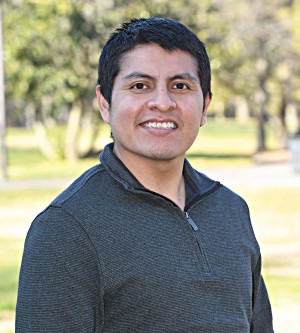
Dr. Luis Peña-Lévano has joined the School of Agricultural and Natural Sciences as an assistant professor of agribusiness and resource economics in its Department of Agriculture, Food and Resource Sciences. He will also be a key member of UMES Extension as an economist helping in the area of farm business management and community development.
Peña-Lévano’s expertise lies in agribusiness, financial management, international trade, agricultural and environmental policy, and mathematical optimization. His most recent post was as a lecturer in the University of Florida’s Department of Food and Resources Economics. While there, he received its 2020 “Innovation Teaching Award” in the College of Agricultural and Life Sciences. Peña-Lévano has taught microeconomics, mathematical methods for economics, international trade, agribusiness financial management, futures and option markets, and environmental and resource economics. At UMES, he will instruct graduate students on quantitative methods, micor/macroeconomics and advanced agricultural finance.
“Dr. Peña-Lévano is an accomplished agricultural economist who will complement the work of the UMES Extension team by adding an economic dimension to our existing informal educational programs,” said Dr. E. Nelson Escobar, associate dean for UMES Extension. “He will also provide guidance to the planning of future needs assessments for the residents of the Eastern Shore of Maryland.”
A native of Peru, Peña-Lévano has interacted with agriculture since his early days. His family, he said, taught him the importance of “equilibrium in life,” which he applies to his daily routine and how he sees economics. “Balance between family, friends, job, hobbies and time to rest are crucial for a happy life, which is the principle of economics, optimize all conditions under limited resources.” His interest in the field stems from his passion for trying to understand how economics can improve society’s quality of life.
Peña-Lévano is author or co-author of numerous peer-reviewed articles in the field related to the environment, economics and agribusiness. In 2020, his article, “Climate Change Interactions with Agriculture, Forestry Sequestration, and Food Security,” co-authored with colleagues from Purdue University, was awarded “Best Publication” in the journal, Environmental and Resources Economics. The European Association of Environmental and Resource Economists critiqued his work commenting, “In this superb paper, the authors produce both a truly excellent example of multidisciplinary collaboration and internationally significant contribution to our understanding of the interplay between climate change, mitigation policies, and their impacts on the global economy.”
Also last year, his article, “COVID-19 and the Agriculture Industry: Labor, Supply Chains and Consumer Behavior” was promoted in more than 30 national media outlets. His most recent article written with his colleagues is “Latin America’s Superfood Economy: Producing and Marketing Acai, Chia Seeds, and Maca Root” in the January issue of Choices, a magazine of the Agricultural and Applied Economics Association. He is currently writing the new version of two books for McGraw Hill slated for publication in 2021, the second edition of “Schaum’s Outline of Mathematical Methods for Business, Finance and Economics” and the fourth edition of “Schaum’s Outline of Calculus for Business, Economics and Finance.”
Peña-Lévano is also a frequent reviewer of articles in prestigious peer-reviewed journals such as the American Journal of Agricultural Economics, the Environmental and Resource Economics Journal and Choices.
The economist earned a doctoral degree in agricultural economics in 2017 from Purdue University in Indiana. His dissertation, “Carbon Taxes, Forest Carbon Sequestration, Climate-Induced Land Yield Changes and their Interactions,” received a “Distinguished Dissertation Award.” Peña-Lévano holds a master’s degree in agricultural and applied economics from the University of Georgia and a bachelor’s in food science and agroindustry engineering from Zamorano University in Honduras.
Photo by Todd Dudek, photographer/videographer, Agricultural Communications, University of Maryland Eastern Shore, tdudek@umes.edu.
Gail Stephens, agricultural communications and media associate, School of Agricultural and Natural Sciences, University of Maryland Eastern Shore, 410-621-3850, gcstephens@umes.edu.

